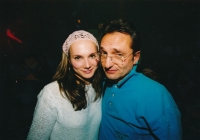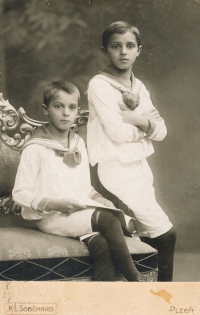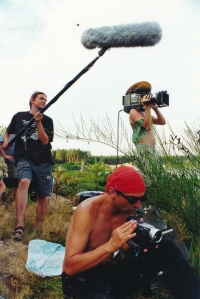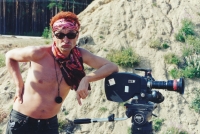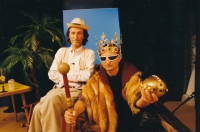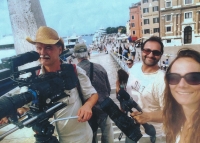Master of Fine Arts Otakáro Schmidt
* 1960
-
“My interpretation is that we believe in the Eucharist. This means the transformation of the host – from the Greek word for sacrifice – that Jesus Christ is present in this sacrifice, in the Eucharist, in the transformation that takes place during the service. My final speech is about Corpus Domini, which is a holiday based on a Czech priest who was possibly an advisor to Otakar II. That’s one of the versions. The other version is that he may have been German and was a courtier in the court of Otakar II. In any case it was a person who, allow me to explain, my last contribution, an explanation, if I may. Baptism and Confirmation are the steps taken towards the Pentecost – fifty days after Easter – in the Bible, I won’t get into details, that’s what it is. And those are…From Rychlé šípy (a comic book series about a boys’ club and their adventures) we know the holidays during which they had a canoeing trip. That’s in May. Approximately four hundred miracles has taken place during this holiday, about half of them in Orthodox Christianity and the other half in the Catholic Church. Not in the Protestant faith, however, because protestants don’t believe in it. It is an important bridge between the Catholic and the Orthodox environment after five hundred years of separation. It’s a bit complicated because the Orthodox faith includes Autocephalous churches as well as regional, local churches such as the churches in Moscow and St Petersburg. So this is complicated in comparison with Catholic unity even though the Catholic Church includes Opus Dai as well as the Franciscan order. Simply put: many streams that are united, which is important. The bridge is there to bring the worlds that believe in the Eucharist closer, in the transformation, in stigmata, believe in these moments that are highly spiritual and close to both of these Christian environments. That’s how Corpus Domini was started…the holiday began around the year two thousand when more miracles started taking place, such as blood dripping from the host or the host changing into muscle tissue, something we documented with the Franciscans in various places. For example, the five pieces of muscle tissue from 8th century Italy that weigh always exactly the same regardless of the number of pieces being weighed. Incredible…There are even things that elude scientific understanding such as that the relic Shroud of Turin has blood type AB…as in the Shroud of Turin! The Shroud is another phenomenon recognized by both Catholic and Orthodox churches and another bridge that brings us closer together.”
-
“I was always among people during production and during post production, in the editing room and so on. At the same time I was completely alone at home and in the world. Imagine you are forty years old and you have no living relatives – all you have is a few friends. That is a very odd feeling, which helped me a bit and made me stronger. It was a spiritual exercise and at the same time a life situation that I would not like to experience again. I used to be immersed in false spirituality called esotericism and I used to know all these fortune-tellers, shamans and astrologists. We used to have an (esoteric) program on the radio station Limonádový Joe where I worked for two years. So I was on spiritual path, although a false path, that eventually took me – with Christ as my buddy, my dead parents and my aloneness – to somewhere higher. I realized that even though I was crazy about the film Eliška Likes It Wild that it isn’t all that great and something better has to come. One of the visionaries I was acquainted with at the time, one of the better ones – not a travelling ‘reader’ – who really did have insights sometimes and things came true. These people have ‘it’ but it’s about half and half. Sometimes dark voices whisper in their ear. I asked: ‘When am I going to meet a woman finally?’ – considering what my life was like up to that point – ‘When am I going to have a family?’ And he said casually that it will happen in about half a year.’ And I said, ‘Half a year…Can you be more precise?’ And he said: ‘Mid April.’”
-
“I was a firmly rooted to something and it was a great group of people. Mimosa (performing art troupe) and the shooting I talked about the last time. First the merry-go-round where Suška sort of threw us out, but then the friendship with Venca (Václav) Marhoul and Mimosa, that exclusivity a bit, the shooting, as I said, from those starter pistols. In the Černé (divadlo) and so on. Sklep was more like a family. It was more than theater. I was deeply engaged in all the trips, I was totally submerged in the whole thing. The thought that I would leave some day never crossed my mind, but after the revolution everyone – including me – had different ambitions. We started having our own performances within the framework of Sklep. I performed in Tajuplný ostrov, which I also directed. This production was done within the framework of Sklep. I am not sure if that was ok. Vašek (Václav) Marhoul simply said: ‘Hey, we can make it work by having smaller groups in the framework of Pražská pětka.’ David Vávra and I performed in Míč, a nostalgic retro piece about the old times. And so on.’ Then there were performances involving Sklep as a whole such as Mlýny and Jedlovým písmem. After the revolution I felt I had a chance to get into FAMU. This was shortly after the revolution when I was accepted and at that instant I knew that I would be kissing theater goodbye. I said to myself that I am thirty so it is now or never. It was a hidden desire of mine. Well, and when I landed a job with Vachler and was at FAMU on top of that, it was clear that theater is out. One part of my life was over and another very important part of my life began. That’s why the revolution was very important in my life. I could choose between film and professional theater, even though before that I was at the F.X. Šalda state theater in Liberec. Even though I was at Černé divadlo it was professional. To do theater professionally, all of this took place during the revolution so that is why it is so important to me.”
-
“Risk always paid off in my case. Even though I was no hero I have to admit. This one time we were interrogated and I had some erotic magazines from France. This was at a later time. They picked us up on the street and I had the magazines hidden in a newspaper I was carrying. Because it was in plain sight, it did not even occur to them that I could be carrying banned literature. It was not politically, but erotically, banned literature. At this moment it dawned on me that if they leaned into me, maybe I would have gave in and signed up (to be an informant). So I never belittle anyone who threw in the towel. You never know. I had a few heroic moments and one of those…It was risk-taking before and after graduation. When I wanted to leave Škoda they threatened that if I don’t join the Socialist Youth Union I won’t be able to graduate. And I said – even though it (graduating with a matura) was a top priority in our family, and even university studies were desirable – and I said that I will not become member of the Socialist Youth Union and therefore I will not graduate with a matura. In the end they let me graduate with a matura, so it was only a scare tactic on their part. So it paid off to ignore their scare tactics. The second time around, when I wanted to leave the Škoda job, it was easier to do. Maybe I am not saying it precisely. Because I already knew that it’s scare tactics most probably. Nevertheless I left Škoda within six months after leaving the military. I worked at the water works for three years where…We copied banned literature (samizdat publishing). I travelled to France, and they let me go because none of my friends or family got to go. I went alone. Even though I wasn’t married and had no children, they figured since I have family connections here they can depend on me to come back. I stayed with some friends in Paris and then I travelled all around the country. I have to say the trip was a terrible disappointment, on one hand it was the West I dreamed about with all the merchandise, scents, Coca Cola, (music) records and so on and on the other hand I wasn’t…I lived in the home of a Parisian who was recommended to me. I felt completely crushed and I told him ‘You know…where I come from we rebelliously leave an empty can on top of a car and keep walking. And here you know…I feel that everything is allowed.’ It was as if the rebellion inside of me swelled up because of the place I was coming from. Punk rock culture was over there as well, the psychedelics, the music…the point was that our rebellion was against something and that rebellion was forbidden. And when it was allowed, it was actually unfounded nonsense.”
-
“I am a nervous and unstable type and, on top of that, I stand up to the establishment. So I said, no, I won’t go (mandatory military service). If I do end up going I will get an exemption (based on a psychological evaluation). I remember this one time when we were given rifles for target practice. I put my weapon down, went off to the side and started crying. I didn’t rehearse this part enough. Only truly great actors are able to cry at the drop of a hat, so I had a small container of some sort – oh I remember now – a film canister where I had some salt. When they came over to see what’s going on I rubbed the salt into my eyes and told them that ‘I could shoot a deer by accident’ and they said, ‘aha’ and sent me to a psychological examination. And that saved me. At the doctor’s office…there was a…what were they called…? Since he was university-educated he had a rank. He was a doctor. He winked at me so he probably knew what was going on. He helped me by leaving me alone. One more thing I did…It was the nonsense I was taught back home in Plzeň...They (friends) told me ‘You have to be sworn in so it all looks legitimate and they will let you go after five or six months. Otherwise your plan might not work.’ I don’t know why they said that, because I could have been released sooner. But the whole thing did look more legitimate. I did everything I could to hold on to the ceremony. They (the military) tried convincing me to leave: ‘You should go to the hospital, you’ll get more food, vitamins and more.’ I said: ‘No, no, I want my parents to see me in uniform saying the oath.” This was much more believable because I knew that if I make it past the ceremony I will get to go home. So the whole month – the admittance month – I was in the military, but I spent my days at the doctor’s office.”
-
Full recordings
-
Praha , 20.02.2019
(audio)
duration: 02:02:49
-
Praha, 01.03.2019
(audio)
duration: 01:40:29
Full recordings are available only for logged users.
Our life, a millimeter among kilometers
Otakar Schmidt was born in Plzeň on July 28, 1960. He worked as a machine fitter for locomotives in the Škoda factory during the 1980s. He had friends among the youth subculture in Plzeň and his interest in music led to him meeting the band Psí vojáci and their friends. After getting an exemption from mandatory military service he worked as a machine operator at the Plzeň water works, where, along with other coworkers opposed to the regime, wrote copies of samizdat publications. His nonconformist lifestyle attracted the attention of secret police (StB) so he was called in for occasional interrogations and his apartment was subject to house searches. After a year of preparation he started attending the Jaroslav Ježek Conservatory in Prague, where he relocated. He collaborated with the pantomime troupe Mimosa, with the Sklep theater and the loose (performing arts) association Pražská pětka. He appeared in a number of films and productions for the stage. He performed abroad with various theater troupes. After political changes in 1989, he studied screenwriting and dramaturgy at the Film and TV School of the Academy of Performing Arts in Prague (FAMU). He authored several feature films and a number of documentaries; he is engaged in a number of other activities.
